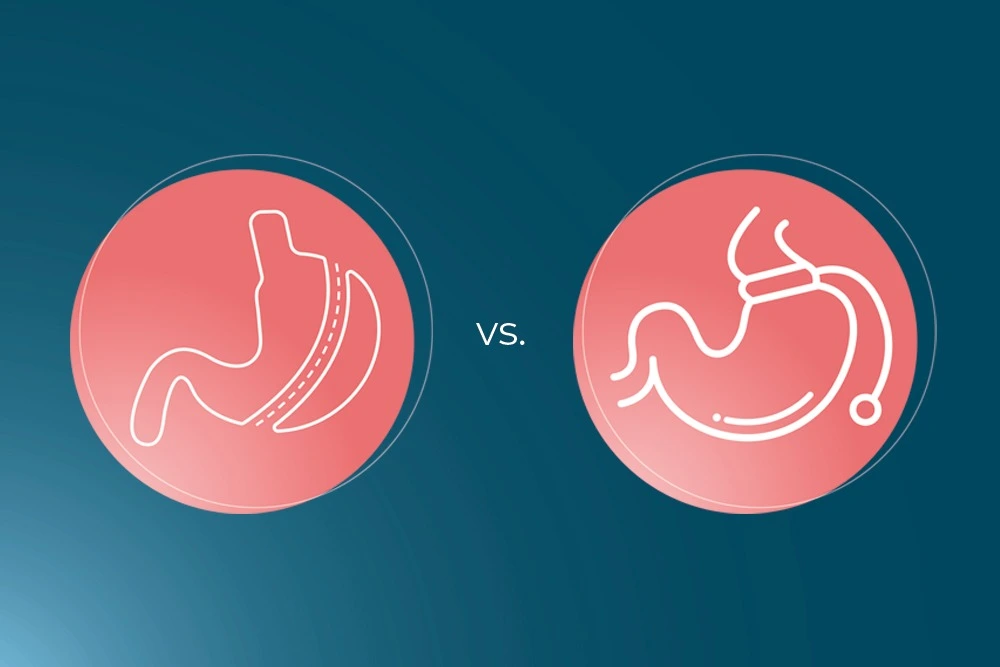When it comes to weight loss surgery, two of the most popular options are gastric sleeve surgery and gastric bypass surgery. Both procedures have distinct approaches and outcomes, making it essential for patients to understand the differences between them. In this blog, we will explore what gastric sleeve and lap band procedures entail, compare their risks and costs, discuss recovery times, and provide insights from treatment reviews.
What is Gastric Sleeve?
Gastric sleeve surgery, also known as vertical sleeve gastrectomy, is a restrictive weight-loss procedure that involves removing a significant portion of the stomach—approximately 80%—which limits the amount of food intake. This results in a smaller, sleeve-shaped stomach that limits food intake and reduces hunger hormone levels. The surgery is typically performed laparoscopically, meaning it involves small incisions and less trauma to the body.
Benefits of Gastric Sleeve Surgery
- Significant Weight Loss: Many patients can lose 60-80% of their excess weight within 12-18 months. This rapid weight loss can lead to substantial health improvements and an enhanced quality of life.
- Improved Health Conditions are often reported after both band and gastric sleeve surgeries.: Conditions like type 2 diabetes, sleep apnea, and hypertension often improve or resolve entirely after bariatric surgeries. Studies show that many patients experience remission of obesity-related conditions after undergoing a bariatric procedure, leading to a healthier lifestyle.
- Permanent Solution: Unlike the lap band, gastric sleeve surgery is generally considered a permanent procedure. The removal of a large portion of the stomach means that the changes made are irreversible, which can help with long-term weight management.
- Minimal Dietary Restrictions: While patients need to adapt their eating habits, many find that they can enjoy a variety of foods without the stringent restrictions that some other weight-loss surgeries impose.
What is Lap Band?
Lap band surgery, also known as laparoscopic adjustable gastric banding, involves placing an inflatable silicone band around the upper part of the stomach. This creates a small pouch that limits food intake. The band can be adjusted post-operatively by adding or removing saline, which allows for personalized control over the rate of weight loss in lap-band vs gastric sleeve comparisons.
Benefits of Lap Band Surgery
- Adjustable: The band can be adjusted to suit the patient’s needs, making it a flexible option for weight management. Patients can have saline added to tighten the band or removed to loosen it, providing control over food intake.
- Reversible: Unlike gastric sleeve surgery, the lap band procedure is reversible, allowing patients to have it removed if necessary. This feature can be appealing for those concerned about making permanent changes to their anatomy.
- Less Invasive: The procedure is less invasive than gastric sleeve surgery, which may appeal to some patients. The recovery is often quicker, with less immediate pain and discomfort.
- Lower Risk of Nutritional Deficiencies following surgery is a crucial consideration for patients.: Because the lap band does not involve removing a portion of the stomach, patients may face fewer long-term nutritional deficiencies compared to gastric sleeve patients.
Gastric Sleeve vs. Lap Band: Risks
Both gastric sleeve and lap band surgeries have associated risks, but they differ in nature and frequency.
Gastric Sleeve Risks
- Surgical Complications: Risks include infections, bleeding, and leaks from the stomach. Though rare, these complications can lead to serious health issues and may require further surgical intervention.
- Nutritional Deficiencies: Patients may require lifelong vitamin and mineral supplementation due to reduced nutrient absorption. Common deficiencies include vitamin B12, iron, and calcium, necessitating regular monitoring and management after any type of gastric band surgery.
- Irreversible Changes can occur after a gastric sleeve procedure.: The permanent nature of the surgery means that patients must commit to significant lifestyle changes. Those who do not adhere to recommended dietary guidelines after a gastric bypass may experience complications such as weight regain or other health issues.
Lap Band Risks
- Band Slippage: The adjustable band can slip out of position, which may require additional surgery to correct. This can lead to discomfort, nausea, and complications related to food intake.
- Inflammation and Erosion: The band may cause inflammation or erosion of the stomach lining, leading to pain and further surgical procedures to remove or reposition the band following surgery.
- Need for Adjustments: Patients may require regular visits to adjust the band, which can be inconvenient. This need for ongoing care can be a deterrent for some individuals seeking a more hands-off approach to weight management.
- Potential for Weight Regain: If the band is not adjusted properly, patients may find themselves regaining weight, leading to frustration and disappointment.
Gastric Sleeve vs. Lap Band: Cost
Cost is often a deciding factor for patients considering weight-loss surgery.
Gastric Sleeve Surgery Cost
The price for gastric sleeve surgery can vary widely based on the surgeon’s experience, the facility, and the geographical location. Typically, the cost ranges from $7,000 to $20,000, including pre-operative consultations, surgical fees, and follow-up care. Some insurance plans may cover part of the cost, depending on the individual’s medical history and the policies of the insurance provider.
Lap Band Surgery Cost
Lap band surgery is usually less expensive upfront, ranging from $5,000 to $15,000. However, ongoing costs for adjustments and potential complications may increase the overall financial commitment. It’s important for patients to consider not only the initial price but also the long-term expenses associated with follow-up care and adjustments.
Summary of Costs
While lap band surgery may appear cheaper initially, patients should consider the long-term costs associated with adjustments and possible complications, as well as the effectiveness and longevity of weight loss outcomes. Consulting with healthcare providers about financing options and insurance coverage can help clarify the financial aspect of each procedure.
Gastric Sleeve vs. Lap Band: Recovery Times
Recovery times can significantly impact the patient’s experience and the overall success of the surgery.
Gastric Sleeve Recovery Time
- Hospital Stay may vary depending on whether the patient undergoes gastric bypass surgery or a lap-band surgery.: Typically requires a 1-2 day hospital stay. Patients are closely monitored for any complications before being discharged.
- Return to Normal Activities can be quicker after certain bariatric surgeries compared to others. following surgery can vary significantly between different bariatric surgeries.: Most patients can return to work within 1-2 weeks, depending on their job and physical demands. Those with more physically intensive jobs may require additional time off to heal.
- Full Recovery from a bariatric procedure often requires a commitment to lifestyle changes.: Complete recovery may take 4-6 weeks as the body adjusts to the new stomach size and dietary changes. Patients are advised to gradually increase their activity levels and adhere to follow-up appointments for optimal recovery.
Lap Band Recovery Time
- Hospital Stay: Usually requires a shorter hospital stay, often same-day discharge, which can be more convenient for patients.
- Return to Normal Activities: Patients may return to work within a week, but this can vary based on individual recovery. Those with physically demanding jobs may need to consider more extended leave following surgery.
- Adjustment Period can vary significantly between patients who choose lap band vs gastric sleeve options.: Ongoing adjustments may require additional time and visits to the healthcare provider. Patients should be prepared for this as part of their long-term management plan.
Treatment Reviews: Lap Band and Gastric Sleeve
Lap Band Treatment Reviews
Many patients appreciate the adjustability and reversibility of the lap band procedure compared to the gastric sleeve procedure. Positive reviews often highlight the initial weight loss success and the ability to tailor the band around the top to individual needs. However, some report frustrations with the need for frequent adjustments and potential complications like band slippage or erosion. Overall satisfaction can vary widely, with some patients achieving their weight loss goals while others find the results less effective over time.
Gastric Sleeve Treatment Reviews
Reviews of gastric sleeve surgery vs gastric sleeve surgery often highlight significant weight loss and improvement in obesity-related health conditions. Patients frequently report a smoother post-operative experience compared to lap band surgery, with fewer complications and a more straightforward recovery process. Many express satisfaction with their new ability to engage in activities they previously found difficult, such as exercising or playing with their children after undergoing sleeve surgery removes excess weight. The commitment to lifestyle changes is a common theme in reviews, as long-term success is closely tied to dietary and exercise habits post-surgery.
Key Considerations When Choosing Between Gastric Sleeve and Lap Band
Long-Term Commitment
Both procedures require a commitment to lifestyle changes, but the nature of that commitment can differ significantly between lap band vs gastric sleeve approaches. Gastric sleeve patients must be prepared for permanent changes, including the amount of food they can consume, and the necessity of adhering to a strict diet and regular exercise regimen. Lap band patients may enjoy more flexibility initially but must also engage in consistent follow-ups to ensure the band is adjusted appropriately.
Personal Health Factors
Individual health factors, including BMI, existing medical conditions, and previous weight loss attempts, should play a significant role in the decision-making process. Consulting with a bariatric surgeon can help clarify which option, such as gastric bypass or the differences between lap-band and gastric sleeve surgeries, may be best suited to an individual’s specific circumstances.
Goals and Expectations
Understanding personal weight loss goals and having realistic expectations about the differences between lap-band and gastric sleeve outcomes is crucial. Gastric sleeve surgery may provide quicker results in terms of weight loss, while lap band surgery might offer a more gradual approach. Patients should weigh the differences between lap-band and gastric sleeve surgeries when deciding which surgery aligns best with their goals.
Follow us on Social Media
internationalplusofficial
internationalplus
internationalplusdental
This content is written, reviewed, and approved by the International Plus Medical Review Board to ensure clinical accuracy and adherence to strict editorial standards. All medical information is regularly monitored, audited and updated in light of the latest scientific advancements.
However the information provided here is for general informational purposes only and cannot be used for self diagnosis or making individual health interpretations. Results of medical treatments depend on individual anatomy and the unique healing process of each patient. This information should not replace a personal consultation with a qualified healthcare professional. To understand the best options for your specific needs and to receive a personalized treatment plan, we invite you to book a free consultation with the expert medical team at International Plus.
International Plus was established from scratch in 2014 with the sole purpose of providing a world class center for plastic and cosmetic surgery by SAMİLSAN SAĞLIK HİZMETLERİ TURİZM DANIŞMANLIK TİCARET LİMİTED ŞİRKETİ International Plus has developed a worldwide reputation for its unique treatments and techniques. With over 10 years of experience, our talented medical experts are among the best in their respective fields. You are our priority. We are convinced that good communication between you and your surgeon is essential when planning your treatments. We offer realistic advice and the most suitable treatments for you.




